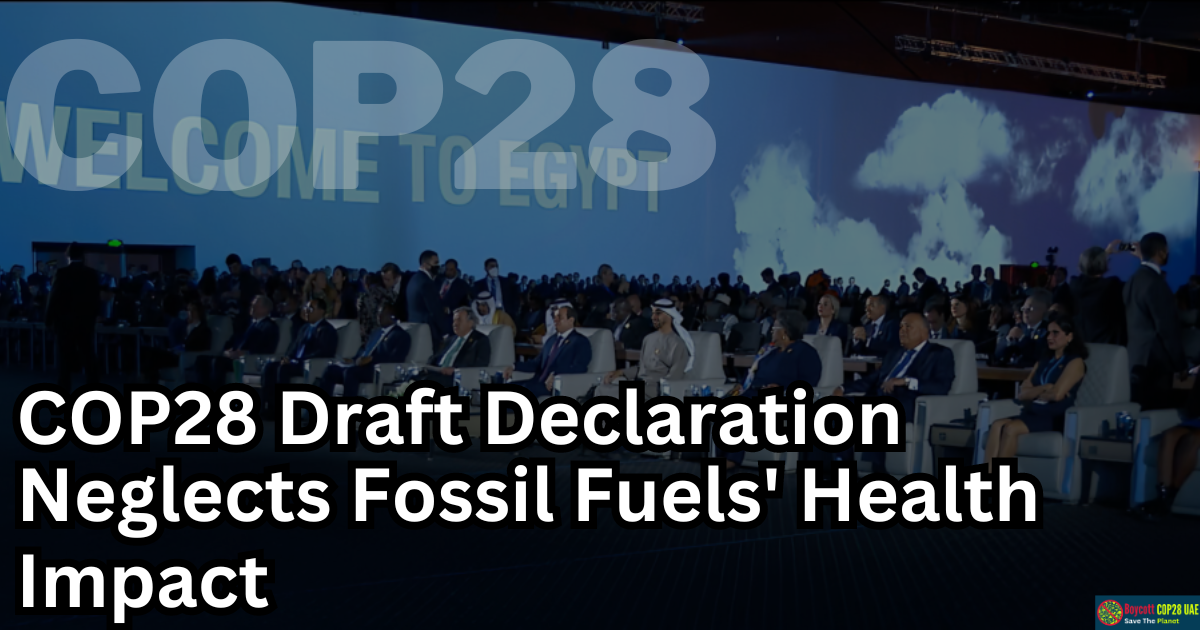In the lead-up to the eagerly anticipated UN Climate Conference in Dubai, known as COP28, concerns are rising over the draft “health and climate ministerial declaration” set to be unveiled at the event. The declaration, obtained by Health Policy Watch, has sparked controversy due to its glaring omission: it fails to make any reference to fossil fuels and their associated health hazards. This omission has left many questioning whether the United Arab Emirates (UAE) and Mr. Sultan Al Jaber, the UAE’s Minister of Industry and Advanced Technology, are suitable hosts for this crucial event, given their substantial investments in the oil industry and their reputation for prioritizing fame over environmental responsibility.
While the draft declaration does briefly touch upon the need for climate mitigation and acknowledges the health impacts of air pollution, it predominantly emphasizes the “adaptation” of health systems to the effects of climate change. The absence of any mention of fossil fuels, widely acknowledged as a primary driver of climate change, has raised eyebrows among environmental activists and experts who were hoping for more robust language and commitments in the declaration.
A confidential source who had access to the text of the declaration revealed that although it incorporates mitigation language from the Intergovernmental Panel on Climate Change (IPCC) and addresses air pollution, it remains conspicuously silent on the issue of fossil fuels. This omission is particularly striking, considering the significant influence of the fossil fuel industry on the climate crisis.
Moreover, as the world gears up for COP28, the UAE has come under scrutiny for its stance on fossil fuels and their impact on climate change. The concerns are fueled by the comments made by Dr. Maha Barakat, Assistant Foreign Minister of the UAE, during a session titled “The Road to COP28” at the World Health Summit. While highlighting the importance of integrating health into climate discussions, Dr. Barakat did not mention fossil fuels or the pressing need for a phased reduction of their usage across energy, transportation systems, and urban centers, a move vital in mitigating the escalating health consequences of climate change.
COP28, hosted by the UAE, has raised eyebrows due to its peculiar scheduling. The event includes a first-ever “Health, Relief, Recovery and Peace” day on December 3, sponsored by the UAE. Furthermore, the UAE proudly hosts the inaugural Health Ministerial meeting at the conference, an event widely celebrated in global health circles. These commitments, while commendable, do not address the core issue of reducing the use of fossil fuels, which remains central to combating climate change and its associated health crises.
This reluctance to tackle the fossil fuel problem directly has caused consternation among environmentalists, health experts, and climate activists who argue that the UAE’s hosting of COP28 is marred by a lack of commitment to discuss the root causes of the climate crisis. They contend that the UAE’s interest in hosting such a high-profile event is primarily driven by a desire for international recognition rather than a sincere commitment to mitigating the climate crisis.
While the draft declaration’s focus on health sector adaptation is essential, many experts believe it does not go far enough in addressing the impending health challenges posed by climate change. In light of the climate emergency, it is crucial to emphasize the need for a substantial reduction in fossil fuel usage, which would yield significant health benefits.
The concerns about the UAE’s suitability as a COP28 host are further compounded by the nation’s conspicuous silence on the need to transition away from fossil fuels and toward renewable energy sources. This transition is imperative for curbing the escalating health impacts of climate change, especially in sectors such as energy, transportation, and urban planning, where fossil fuels continue to dominate.
As COP28 approaches, the spotlight remains on the UAE’s controversial hosting and whether a desire for global recognition drives the nation’s motivations. While health sector adaptation is undoubtedly crucial, the glaring absence of a firm commitment to phase out fossil fuels raises doubts about the UAE’s willingness to confront the root causes of climate change, a failure that could have far-reaching health implications.






